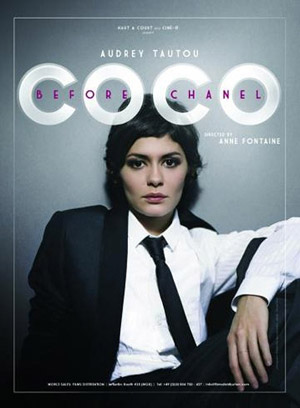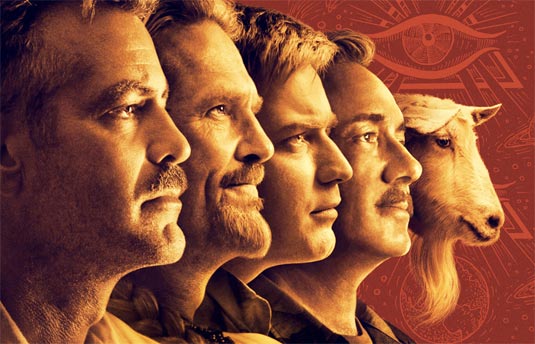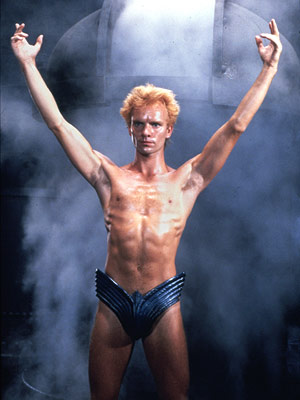
Seen at The Tricycle Theatre, August 2009.
Biography is a tricky genre. Telling a story that is not your own requires interpretation and a process of self effacing. A director, writer, and producer have to decisively set out a path that may or may not accurately depict a subject. The best biographical storytelling, in my opinion, centers on enigmas. Those characters that evoke nostalgia from a movement or a nation or an era make for the best stories (i.e. Lawrence of Arabia, Martin Luther King, Jr., Jesus, and many others). In our post-post-enlightenment discourses we are permitted, as a viewer, to deconstruct not just the subject but also the story being told. I personally am most convinced and partial to those authors that have nothing to hide. Sure, every story teller has an agenda; let's accept this fact and forget our intellectual musings and just let a story effect us.
Anne Fontaine has taken on, in this film, the task of re-telling the narrative of an icon in France and the fashion world as a whole. Inasmuch as Gabriell Bonheur (Coco Chanel) has been depicted in disparate images for many years now, telling her story requires simplicity to be fresh. Fontaine exceeds fresh and resolutely achieves original and it's not because she spent millions or uncovered unknown diaries and love letters of Coco. She focused on an attribute of the character and diligently pursued this from beginning to an end you wish wasn't. She revealed Coco's proclivity, be it because of nature or nurture--you are left wondering, to see the unseen and less apparent. In the scholarship of storytelling we can talk of how focusing on a character's character in a non-linear fashion is one method of biography, blah, blah, blah. I would rather sit back and let a story effect me, I encourage you to do the same while watching this movie.
It is no secret that actors make or break a movie for me. Benoit Poelvoorde and Audrey Tautou took a first rate script and classic story and turned it into something great. It is rare for me to forget that the actors on screen are actors; every scene that these two were in was an extended non-reminder of such. They absolutely become these people, you don't even have to believe it, they just are (kind of like evolution--it doesn't need you to believe in it to be true).
As I mentioned, Anne Fontaine sought out an original means by which to tell Coco's story. French cinema had made dozens of films about her. Coco, in her life, sought and worked hard to make herself aloof. She was described as anti-social, stuck-up, corky, distant, and altogether hidden in her drive. Audrey Tautou had been approached numerous times to make a film about Coco. She refused all of them because she didn't believe any of the stories attempting to be told. When she met with Anne Fontaine before filming she made clear that she would not research Coco, she would not watch every film ever made about Coco, she would not read all the biographies about Coco, she would simply call upon the jumbled mess that was her image of the character and interpret it as she saw fit (I wonder if Peter O'Toole did something similar, I don't think he did. I have heard stories that he read Seven Pillars like 20 times). Tautou's and Fontaine's clean slate comes through in the cerebral parts of the film when we are led to imagine and dream along with Coco.
What I like best is that nothing is decided for you. Themes of humanity are prevalent in every scene; the viewer feels with the characters, however, judgement of how an event or part of Coco's life may or may have not effected her is left ambiguous. The interpretation of successive happenings is never in the foreground but always intangible. Piecing together her life is gapless and therefore it is impossible to extrapolate singular life-changing events. I think this is more a picture of reality than any timeline. I hate timelines. How they did this so well I do not know.
The reason this is a 'must see' is because not only is this a lesson in biographical storytelling, but it is an aesthetic masterpiece. The physical lens of this movie is as dynamic as Coco. It makes you want to design clothes or at least walk down Jermyn street and buy tons of expensive clothes. The cinematography is simple, yet thorough. Any film crew can record a sunset, but Anne Fontaine shows us the unseen.
You leave this film inspired. Watching a woman, in a man's world, seek out a life of her own, as an individual, is inspiring. The road to individuality is never clean and pure and we aren't spared the messy parts of being a woman with ambition. We aren't spared the realities of social class discrimination and the suppression of women. However, we are given hope, that our divisive nature doesn't have to be put up with. All this crap can be transcended and art, hard-work, and a dedication to relationships can help us do just that; transcend.
I highly recommend this movie.
I did not like this movie just because it had subtitles.































